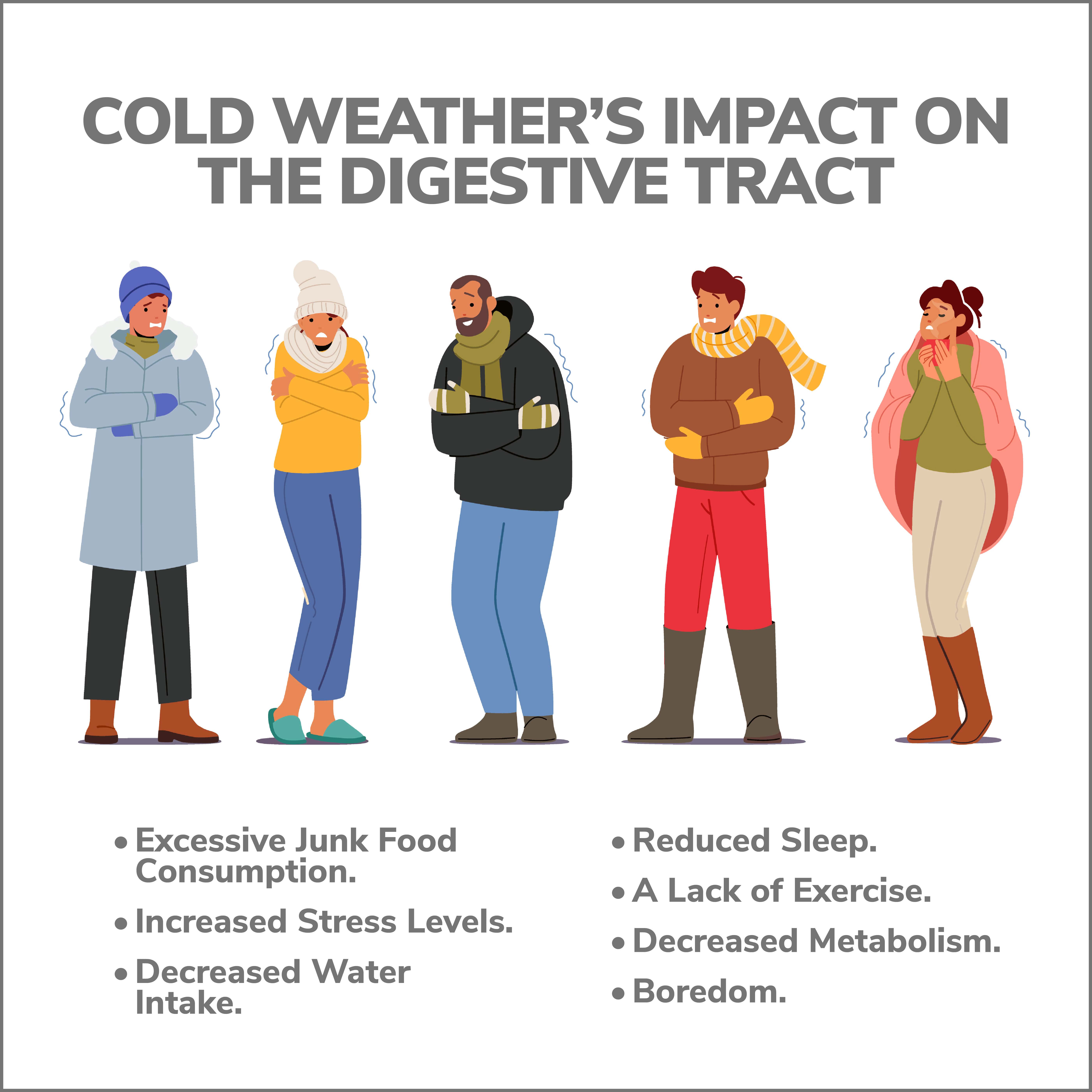
How Can I Improve My Digestion in Cold Weather?
The winter season is notorious for producing respiratory ailments like colds and the flu. You may not realize that cold weather can cause various digestive issues, but they can be reduced or even prevented.
Cold Weather’s Impact on The Digestive Tract
Medical researchers and doctors offer several reasons why winter brings forth gastrointestinal issues, including:
Excessive Junk Food Consumption.
You are more apt to eat comforting, easy-to-prepare, or junk items such as fast foods. These foods contain large concentrations of potentially harmful substances like salt, fat, and sugar. Heavily processed foods are rich in chemicals that can irritate your digestive tract resulting in many unpleasant symptoms.
Increased Stress Levels.
The wintertime proves stressful for many. You may feel greater stress and anxiety when having to worry about issues such as:
- Spending money winterizing your vehicle and home.
- Purchasing warm clothes for yourself and your family members.
- Figuring out how to get yourself to work and your children to school if bad weather hits.
- High heating bills.
Stress is famous for adversely impacting your body and often strikes the digestive tract first.
Reduced Sleep.
Studies have shown that your sleep cycle tends to be disrupted more during winter. Stress has an infamous reputation for adversely impacting your gastrointestinal system. Sleep deprivation often leads to heightened stress and anxiety and elevates your cravings for junk food.
Decreased Water Intake.
During colder temperatures, you typically consume less water. Water is vital to healthy digestion because it helps transport toxins through your digestive system and out of your body. Water is needed to help food particles pass through your intestines quickly and efficiently. Slowed digestion could result in digestive problems like cramping, bloating, and constipation.
A Lack of Exercise.
You are less likely to exercise during winter. A lack of physical activity slows the digestive process.
Decreased Metabolism.
Cold temperatures cause your body to slow its rate of metabolism to conserve energy and produce warmth. This effort significantly lessens digestion time.
Boredom.
During winter, you spend more time indoors. Idle periods often lead to boredom. You might subconsciously kill this time by eating. Food overindulgence can result in gastrointestinal concerns.

How To Boost Digestion During Cold Weather?
Luckily, these issues can be overcome through digestion-boosting efforts such as:
Keeping Warm.
Staying as warm as possible elevates your body temperature and speeds up your metabolism. Wear several layers of clothing and other protective articles such as gloves, hats, and scarves when venturing out into cold temperatures.
Limiting Your Consumption of Carbonated Drinks.
Beverages with notable amounts of carbonation, like soda, irritate your digestive tract and exacerbate other existing problems. Better beverage options include juices, tea, and flavored water.
Drinking Large Quantities of Water.
Consume more water during the wintertime. It helps speed up the removal of systemic toxins, maintain proper and timely digestion, and prevent the worsening of pre-existing digestive issues.
Staying Away from Spicy Foods.
Heavily spiced foods are known to irritate your gastrointestinal system’s lining. This may cause uncomfortable or even debilitating symptoms like heartburn and cramping or worsen other existing concerns.
Consuming Smaller Meals.
Eat several smaller meals per day instead of two or three large meals. This places less strain on your digestive system.
Exercising.
Physical activity is paramount to optimal winter digestive health. Movement increases digestion and stimulates blood flow to the gastrointestinal system.
Reducing Stress.
Stress reduction can reduce winter digestive woes. Identify and take part in productive, healthy, and mind-consuming tension-busting things such as indoor gardening, reading, or crossword puzzles.
Limiting Or Quitting Harmful Vices.
If you smoke cigarettes or consume alcohol, doctors recommend that you quit or significantly reduce your usage of such products. They contain abrasive chemicals capable of damaging your digestive system resulting in many unpleasant and potentially dangerous outcomes.
Winter-Friendly Foods and Beverages
Diet plays a significant role in achieving optimal digestive health. Nutrition experts recommend consuming winter-friendly foods and drinks.
- Oatmeal. This classic breakfast staple proves beneficial on many notable fronts. First, it contains important nutrients like zinc. It is also full of fiber, which is crucial to ensuring proper digestive health and function.
- Soup. Soup is the quintessential wintertime food. Soup is usually eaten warm, which elevates your body temperature. It also contains significant amounts of water. Above all, it is usually filling, which curbs your appetite and prevents overindulgence. Avoid soups with beef, cream, or excessive sodium.
- Vitamin D. Foods containing Vitamin D should be high on your list of winter foods. Products such as shitake mushrooms, milk, salmon, and egg yolks are known to lower incidents of anxiety and depression.
- Green Vegetables. Produce like fenugreek and spinach contain large amounts of fiber. They have enough calories to fill you up and lessen your appetite.
- Herbs and Spices. These additives stimulate digestion and increase body temperature. These food enhancers can be sprinkled atop your favorite foods or mixed with your beverage. Physicians and nutrition industry professionals suggest adding to your diet using products such as:
- Nutmeg.
- Cinnamon.
- Cloves.
- Cardamom.
- Cayenne.
- Turmeric.
- Ginger.
- Ghee. Ghee, also known as clarified butter, enhances the digestive process and helps create healthy gut flora. The product contributes to healthy weight maintenance.

How To Treat Problems When They Occur?
Everyone experiences digestive issues from time to time. When such problems occur, you might ease your discomfort through home care remedies such as:
Not Lying Down.
If your stomach is upset, you should not lie down until the discomfort dissipates. Doing so enables stomach acid to pass into your esophagus, leading to heartburn. Refrain from lying down or going to bed for several hours following a meal.
Consuming A Simple Diet.
When experiencing gastrointestinal distress, you should avoid foods containing wheat and fatty, greasy, or acidic products. You may want to follow the BRAT diet consisting of bananas, rice, apple sauce, and toast.
Using Over-The-Counter Acid-Reducing Medications.
These drugs might provide relief for symptoms like heartburn and indigestion. They should be used only as directed and not for extended timeframes.
When Should You See Your Doctor?
Most wintertime digestive ailments are mild and short-lived. You should consult your doctor if you experience:
- Increasing abdominal pain.
- Persistent vomiting.
- The presence of blood in vomit or stools.
- Swallowing difficulties.
- A continuous sore throat or hoarseness.
- Frequent bouts of diarrhea or constipation.
Any unintentional weight loss should be reported to your doctor as possible.
Contact Us
The winter does not have to be filled with stomach aches and heartburn. Knowing why cold weather impacts digestion and simple remedies to combat these concerns, you can make it to spring happily and in optimal health.
Our practice began more than 15 years ago and has emerged as one of the leading gastroenterology practices in central Florida. We perform a host of diagnostic procedures using state-of-the-art equipment in a friendly, comfortable, and inviting atmosphere where patient care is always a top priority. Contact us today!